What would have happened had petrochemical industry ceased to exist in Taiwan? The Industrial Development Bureau (IDB) under Taiwan's Ministry of Economical Affairs has tried hard to convince Taiwanese citizens that if Taiwan does not build more petrochemical industrial plants, its economy will collapse and people will suffer. On the other hand, environmentalists, activists, and bloggers are looking forward to seeing the end of such a polluting industry destroying the island's lands, water, and air.
On September 6 and September 7, 8 half-page advertisements were published in the four major newspapers in Taiwan, telling the readers that “Without petrochemical industry, we won’t have new toothbrushes, new bicycle tires, new umbrellas, and new ink to print newspapers.” The IDB is the mastermind of the advertisements, and also plans to publish thousands of handbooks for demonstrating the value and benefits petrochemical industry has brought to Taiwan. This series of propaganda aims at persuading Taiwanese to support the government's decision to build the new Kuokuang petrochemical plant on the biggest wetland of Changhua County[en].
So far, IDB has spent TWD 3 million (about USD 100,000) of taxpayer’s money on the ads to defend private corporations’ interests. Environmental groups[zht] and media and press watch organizations[zht] reacted to such an abuse of public expenses by making open statements, while bloggers and online activists adopted a different approach.
Wenli Xu, a well-known Nintendo collector and online activist, designed another set of ads to tell his readers his vision of Taiwan without petrochemical industry: [zht]:
[沒有石化業,老阿嬤就不用赤腳抗爭。]
[沒有石化業,哪來的六輕大火?]
[沒有石化業,白海豚就不必學會轉彎。]
[沒有石化業,沒傘撐也不怕淋到酸雨。]
[沒有石化業,鄉親們就不必圍廠抗爭。]
[沒有石化業,經濟部就不會花四五百萬稅金登匿名廣告。]
[沒有石化業,哪來的狗屁倒灶?]
Umi Wang on Facebook followed Wenli and designed four other ads to mock at IDB's propaganda. Below are two of them:
沒有石化業,哪有油水可以撈
沒有石化業,哪來的毒可以吸

A Facebook fan page has been set up to invite people to share their vision of Taiwan without petrochemical industry.
沒有石化業,雲林也可以跟宜蘭一樣辦童玩節。
Hedula Lee: 沒有石化業,石油要怎樣消耗殆盡?
Dailin Lin 林黛羚: 沒有石化業,抽煙才吸得到煙味。
The output value of petrochemical industry accounted for TWD 1.3 trillion (USD40.6 billion) in 2009, showing its undeniable economic contribution. However, independent environmental news reporter Shuchuan, quoted statistics from the Energy Bureau under the Ministry of Economical Affairs, which indicated that in 2009 petrochemical industry and other high energy consumption industries together used 36.3% of all energy in Taiwan, while generating less than 4% of the island's GDP[zht].
So why is the government still eager to expand such an inefficient industry? Munch provided us with a deliberated answer[zht]:
對於政府,國光石化的建造,重點不只是石化產業,而是二岸經濟臍帶的連結關係。
中國設立海峽西岸經濟區後,政府想在二岸經濟架構下,完成上游台灣,下游中國的跨海產業整合,透過政策管制不肯放行,依舊規劃在台灣設立石化上游產業,期待在ECFA通過後,石化列為早收名單,在二岸跨海合作生產下,原料台灣生產,免關稅進入中國加工,再銷往中國市場,甚至銷往東協。
However, Munch believes that Taiwan government’s plan is a mere fantasy:
台灣石化生產內需已足,再增加的產量幾乎都是外銷為主,但在中國強力要求海峽西岸經濟區內的垂直產業建立,加上2015年量產早已錯失商機,台灣石化業者巴不得國光石化環評不過,台灣生產澈底破局,政府全面開放西進設廠。
Apart from fighting against the ever expanding petrochemical projects in Taiwan, the Environmental Protection Union of Changhua[zht] works to prohibit the government from selling the large piece of wetland in Changhua to Kuokuang petrochemical plant. It has initiated the first environmental trust in Taiwan[en] by urging citizens to collectively buy in the piece of wetland and become shareholders[zht]. More than 30,000 citizens have pledged to join online.

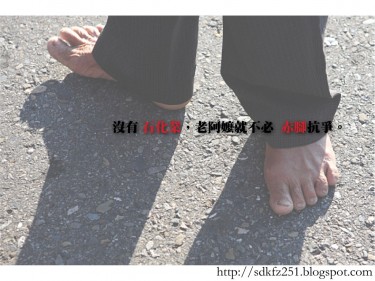

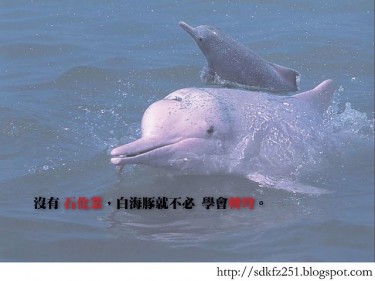
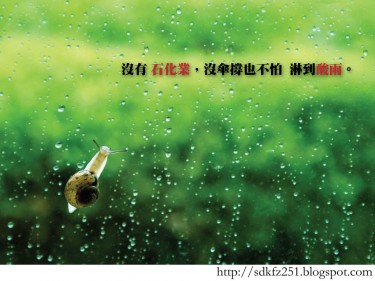

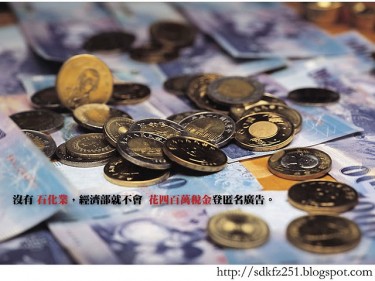
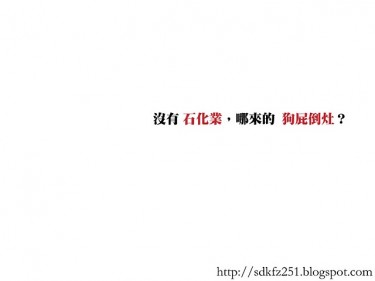







6 comments
Excellent post, Portnoy.
And thank you for mentioning on your hyper-popular blog!
I should include your post on this issue:
http://michaelturton.blogspot.com/2010/08/future-home-of-guoguang-petrochemical.html
Wenli Xu is aiming at the wrong target; just as he is right to complain about being forced to accept the consequences of a petrochemical industry he doesn’t want, others would be right to complain were a government more to Xu’s liking to force them to accept the consequences of not having their jobs in a petrochemical industry.
What is important here is to eliminate the element of force in the connection between government and what different people want from the market. Therefore the correct target is not the petrochemical industry, but the government itself and in particular, the premise of presumed delegation of authority from the people on which it claims to act.
Consider: why wouldn’t the government – just like they did with the Miaoli County farmers – simply expropriate the lands purchased in Changhua by the environmental group? What are they going to do then after they’ve thrown away all their money and energy? Beg?
This campaign will fail because the thinking behind it is simply not serious.
Hi mike, I am not so sure if I understand you correctly or not: Do you mean that activists should focus on KMT but not KuoKuang?
It is not a KMT vs DPP issue, and it is a mistake to view everything through that blue-green lens.
The real issue is whether Taiwan’s society should be governed by voluntary agreements among free individuals or whether some of those individuals calling themselves “government”, get to presume the right to use force in deciding who gets what, where, when and how.
Consider: where would the entire petrochemicals industry in Taiwan be today if it had never received any leveraging from the government monopoly on violence?
The aims of environmental protection and alleviating socioeconomic inequalities can only be achieved by extricating the source of the distortions: the presumed power which government arrogates to itself and dispenses to its’ favored business interests.
So, strategically, one of the first aims of political activism ought to be the removal of the government’s legal provision for land expropriation – irrespective of which party is in power – because this is the trump card which will be used against the environmental group in Changhua if other measures fail.